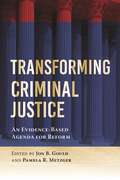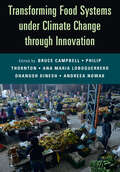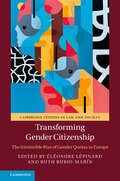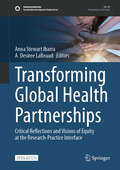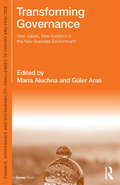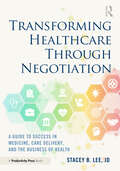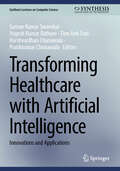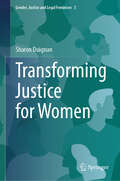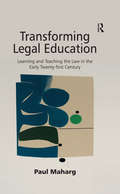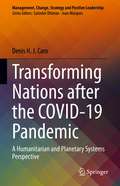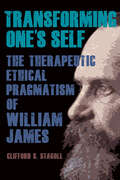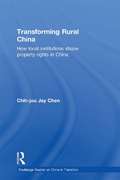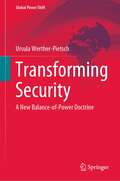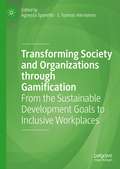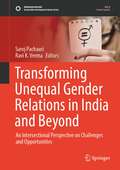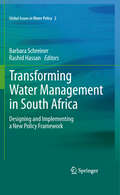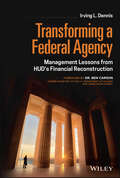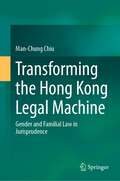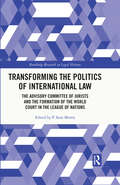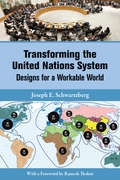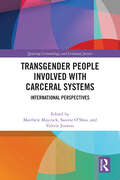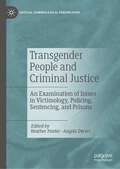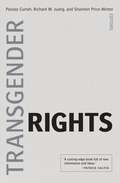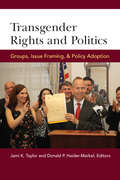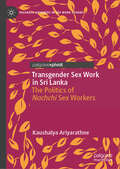- Table View
- List View
Transforming Criminal Justice: An Evidence-Based Agenda for Reform
by Jon B. Gould Pamela R. MetzgerAn evidence-based roadmap for how the American criminal justice system can be reformedThis important volume brings together today's leading criminal justice scholars and practitioners to offer a roadmap for those who want to change the face of the American criminal justice system. This collection of essays addresses thirteen significant issues in justice reform, starting from a suspect’s first interaction with the police and continuing to gun violence, prosecutorial innovation, sentencing reform, eliminating bail, recidivism and re-entry, collateral consequences of crime, and eliminating false convictions. A common theme emerges in this volume: the American criminal justice system is riddled with weaknesses that cause harm and require greater accountability. Each chapter is both educational and prescriptive, helping readers to understand the problems that plague the criminal justice system, how those problems can be addressed, and who should take responsibility for them. Part scholarly research, part account of the justice system’s workings and failings, and part agenda for action, Transforming Criminal Justice aims to educate and move readers to effect change.
Transforming Food Systems Under Climate Change through Innovation
by Philip Thornton Bruce M. Campbell Ana Maria Loboguerrero Dhanush Dinesh Andreea Cristina NowakOur food systems have performed well in the past, but they are failing us in the face of climate change and other challenges. This book tells the story of why food system transformation is needed, how it can be achieved and how research can be a catalyst for change. Written by a global interdisciplinary team of researchers, it brings together perspectives from multiple areas including climate, environment, agriculture, and the social sciences to describe how different tools and approaches can be used to tackle food system transformation. It provides practical, actionable insights for policymakers and advisors, demonstrating how science together with strong partnerships can enable real transformation on the ground. It also contributes to the academic debate on the transformation of food systems, and so will be an invaluable reference for researchers and students alike. This title is also available as Open Access on Cambridge Core.
Transforming Gender Citizenship: The Irresistible Rise of Gender Quotas in Europe (Cambridge Studies in Law and Society)
by Ruth Rubio-Marín Éléonore LépinardGender quotas are a controversial policy measure. However, over the past twenty years they have been widely adopted around the world and especially in Europe. They are now used in politics, corporate boards, state and local public administration and even in civil society organizations. This book explores this unprecedented phenomenon, providing a unique comparative perspective on gender quotas' adoption across thirteen European countries. It also studies resistance to gender quotas by political parties and supreme courts. Providing up-to-date comprehensive data on gender quotas regulations, Transforming Gender Citizenship proposes a typology of countries, from those which have embraced gender quotas as a new way to promote gender equality in all spheres of social life, to those who have consistently refused gender quotas as a tool for gender equality. Reflecting on divergences and commonalities across Europe, the authors analyze how gender quotas may transform dominant conception of citizenship and gender equality.
Transforming Global Health Partnerships: Critical Reflections and Visions of Equity at the Research-Practice Interface (Sustainable Development Goals Series)
by Anna Stewart Ibarra A. Desiree LaBeaudThis is a book about the human experience of conducting global health research, linked to operational responses to the control and prevention of diseases worldwide. Rather than a manual or how-to guide, we propose a roadmap and vision of equitable, sustainable, and impactful partnerships shared through a rich interweaving of voices: North and South, academics and community practitioners, senior mentors and trainees, multiple generations, and multiple disciplines. We focus on the stories that need to be told, the successes and the failures, and visions for a healthier and more compassionate future for humanity.This book was written by more than 90 authors from 26 countries, bringing diverse perspectives on global health partnerships' past, present, and future. Although many of the chapters use examples related to infectious diseases, the ideas in this book are relevant to the broader field of global health research and practice.This book is organized into three sections, broadly related to foundational concepts, present experiences (case studies), and future visions. The first section focuses on the historical colonial legacy of global health and the foundations needed for equitable partnerships, introducing key themes explored throughout the book. These include concepts related to decolonization, ethics, gender, systems approaches and transdisciplinary science, Planetary Health, One Health, team science, and communication. The book's second section draws on case studies of global health partnerships to understand where we are today in global health. Authors share their experiences responding to global health threats, including disease outbreaks, refugee health, stigma, and sexually transmitted diseases, and post-disaster community recovery. The book's third section articulates a new vision for global health partnerships to co-create a more peaceful, equitable, and loving world. This vision is urgently needed to address the challenges emerging in the context of global climate change, the COVID-19 pandemic, and other human threats. This is an open access book.
Transforming Governance: New Values, New Systems in the New Business Environment (Finance, Governance and Sustainability)
by Maria Aluchna Güler ArasTransforming Governance: New Values, New Systems in the New Business Environment, edited by Maria Aluchna and Güler Aras addresses the current state, as well as the development of corporate governance and its perceived tasks and functions, in response to the changing market and regulatory environment. Divided into three parts, the book firstly addresses the variety of theoretical approaches. The inefficiencies, scandals and crises as well as the significant shortcomings and current criticism of shareholder value provide a new setting and theoretical assumptions for the purpose and role of corporate governance in the economy and society. The second section of the book goes on to discuss the forces which lead to the changing corporate governance paradigm, as companies are expected to incorporate not only shareholders but also stakeholders expectations and report and improve upon social and environmental performance. The focus of this section is to present the impact of stakeholders, the requirement for corporate social responsibility and sustainability, as well as the increasing importance of women in management and their participation at corporate board level. Section Three contains corporate governance case studies within various organizational and institutional settings; including the case of family companies, social enterprises/benefit corporations, sustainable companies and emerging markets. The book's contributors comprise both researchers and business experts addressing both theoretical and practical dimensions.
Transforming Healthcare Through Negotiation: A Guide to Success in Medicine, Care Delivery, and the Business of Health
by Stacey B. LeeEvery day, healthcare professionals face high-stakes negotiations that directly impact patient outcomes, organizational success, and career advancement. Transforming Healthcare Through Negotiation introduces the HEAR Approach™—a proven system developed specifically for healthcare's unique challenges across clinical care, service delivery, and business operations.This practical guide equips physicians, administrators, and healthcare leaders with immediately applicable strategies to transform potential conflicts into collaborative solutions that advance patient care while balancing competing priorities.Inside, discover: A Relational Mindset that builds trust across professional boundaries Field-tested negotiation strategies tailored to healthcare’s distinct environments Tactical approaches for maintaining momentum in time-sensitive situations Ready-to-use tools, including the Negotiation Planner and Trilingual Planner "Transforming Healthcare Through Negotiation is an essential read for healthcare leaders... Stacey Lee’s HEAR Approach™ masterfully provides a structured, relational approach that balances clinical, operational, and financial priorities."— Regina Herzlinger, PhD; Brian Walker, DrPH; Ben Creo, MDiv, Harvard Business School"The HEAR Approach™ has improved healthcare and will make you better... aligned beautifully with principles of optimal clinical practice."— James K. Stoller, MD, MS, Chair of the Education Institute, Cleveland Clinic
Transforming Healthcare with Artificial Intelligence: Innovations and Applications (Synthesis Lectures on Computer Science)
by Tien Anh Tran Suman Kumar Swarnkar Yogesh Kumar Rathore Harshvardhan Chunawala Pratikkumar ChunawalaThis book presents the groundbreaking ways artificial intelligence (AI) is revolutionizing the healthcare industry and delves into how AI technologies are enhancing patient care, improving diagnostic accuracy, and streamlining healthcare operations. With real-world examples of how AI is being used in hospitals, clinics, and research institutions around the world as well as insights from leading experts who provide readers with access to cutting-edge knowledge and diverse perspectives on the future of medicine, the book provides a comprehensive overview of the innovations driving the future of medicine. Healthcare is facing big challenges including the growing demand for medical services, the need for more accurate diagnoses, and the pressure to reduce costs. AI can help solve these problems by making healthcare more efficient, precise, and accessible to everyone. Appropriate for healthcare professionals, technology enthusiasts, or simply curious readers about the future of healthcare, this book offers a clear and engaging look at how AI is reshaping the medical landscape for the better. Specifically, the book covers various aspects of AI in healthcare, including diagnostics, treatment planning, patient monitoring, hospital management, and public health. In addition, the book presents the ethical, legal, and societal implications, providing a well-rounded discussion that considers both the opportunities and challenges of AI in healthcare.
Transforming Justice for Women (Gender, Justice and Legal Feminism #3)
by Sharon DuignanThis book delves into the transformative efforts that sought to redefine punishment and rehabilitation, highlighting the pivotal role of Community Service Orders (CSO) and the legislative push to abandon the use of Short-Term Prison Sentences (STPS) for fine default. However, a deeper investigation reveals a critical oversight: the unique predicaments of women entangled in the criminal justice system were neglected. Through meticulous research and analysis, this work sheds light on the nuances of judicial discretion in the District Court, the inconsistencies in sentencing, and the challenges in implementing effective diversion policies. It presents an in-depth exploration of the legislative adjustments aimed at both ends of the sentencing spectrum and the unforeseen consequences these changes have had, particularly on women. Quantitative and qualitative research demonstrate that, in Ireland, there is a higher risk that when a woman reoffends this leads to increasingly harsher penalties. Women are offered fewer meaningful opportunities for self-improvement or programs aimed at addressing the socio-economic factors underscored by their offences. This book will be of interest to a broad spectrum of readers interested in criminal justice reform, gender studies, and socio-political history. It appeals to academics, practitioners, and policymakers in the fields of criminology, sociology, and law, offering fresh insights into the complexities of penal reform and its implications for different genders. Additionally, it caters to a general audience intrigued by the intersection of social justice, legal reforms, and gender equality.
Transforming Legal Education: Learning and Teaching the Law in the Early Twenty-first Century
by Paul MahargPaul Maharg presents a critical inquiry into the identity and possibilities of legal education, and an exploration of transformational alternatives to our current theories and practices of teaching and learning the law. His work takes the view that bodies of interdisciplinary theory and knowledge of the history of legal education are important to all stages of legal education. He also argues that new learning designs - such as transactional learning - need to be developed to help students, educators and lawyers deal with the transitions and challenges facing them now and in the foreseeable future. Throughout, discussions of theory are spliced with case studies of academic and professional legal learning, particularly in the field of technology-enhanced learning. The content of the book will be updated in a community of practice wiki at http://www.transforming.org.uk, which will also allow readers to comment and expand on the book's final chapter.
Transforming Nations after the COVID-19 Pandemic: A Humanitarian and Planetary Systems Perspective (Management, Change, Strategy and Positive Leadership)
by Denis H. CaroIn 2020, the world is in the throes of the COVID-19 global pandemic—an epidemic the likes of which humankind has not experienced for decades. This book speaks to common and fundamental underlying issues that national communities face from a humanitarian and planetary systems perspective. From the globalization initiatives of the last decades, a dynamic and interconnected new planetary system order is emerging.This book underscores the need for decent, ethical, healthy, and just societies that enable individuals to reach full human potential. It explores the future directions of 12 Key Strategic Influencer (KSI) nations through 18 systemic factors that will shape the contours of future planetary governance this century. Finally, it proposes a nonconventional systems paradigm to humanitarian challenges.
Transforming One's Self: The Therapeutic Ethical Pragmatism of William James (SUNY series in American Philosophy and Cultural Thought)
by Clifford S. StagollWilliam James (1842–1910) authored some of America's most original and evocative philosophy and psychology. Until recently, however, his work in ethics attracted little interest, despite suggestions from such distinguished peers as John Dewey that ethical themes suffused his writings. Taking those suggestions seriously, Clifford S. Stagoll provides an original and rigorous interpretation of James's ethics as a response to the socio-economic circumstances of his day, derived from key themes in his metaphysics, philosophical psychology, philosophy of religion, and pedagogical theory. By considering these apparently disparate projects together, Stagoll shows how James's recommendations for pursuing a richer, more rewarding life—an ethics in the classical sense—are justified by intricate and sophisticated analyses of how we think, act, and conceive of ourselves. For James, making a habit of experimenting with life's myriad opportunities is not just a way to counter thinking that has grown too rigid, but a crucial precondition for making the most of one's life and self.
Transforming Rural China: How Local Institutions Shape Property Rights in China (Routledge Studies on China in Transition #Vol. 12)
by Chih-Jou Jay ChenIt is often assumed that privatization leads to profit, and that well-delineated property rights and a strong private sector will help boost an economy. This book investigates the property rights in Chinese enterprises in the reform era, finding that distinction between the public and the private are blurred, that national reform policies are implemented unevenly across the country, and that enterprises owned by local governments, in Shanghai, for example, are actually extremely profitable.
Transforming Security: A New Balance-of-Power Doctrine (Global Power Shift)
by Ursula Werther-PietschThis book analyses the collective security system as it now stands, focusing on strategic and normative frameworks. The old system of international collective security is based on assumptions that are inadequate in relation to current challenges. Against the backdrop of changed geopolitical constellations, democracies under siege and the challenges posed by new types of warfare, critical analysts hold that not a single multilateral institution today is fully up to the task it was created for. The UN, from its founding to the Sustained Peace Approach, represents a fascinating global process of vision-building and adaptation to reality. Based on this understanding, the dynamics of the UN peace and security architecture are examined along with major agendas, from peacebuilding to development. In turn, reform proposals in the post-COVID-19 era are discussed. The book examines whether a regionalization of security structures within the UN framework may offer a way out of global fragility and growing instability factors, a question of utmost importance for conflict prevention and crisis management in the next few decades. In turn, the author discusses a normative positioning of a new intervention logic as the lowest common denominator between collaborative regional orders. Reinvented multilateralism will return as a “must.” Given its scope, the book will appeal to students and scholars of international relations and international security studies, as well as to policymakers in governments and international organizations.
Transforming Society and Organizations through Gamification: From the Sustainable Development Goals to Inclusive Workplaces
by J. Tuomas Harviainen Agnessa SpanellisGamification is the application of game-design elements and game principles to non-game contexts, and has been used to solve problems by applying characteristics of games. Though it has principally been applied in the areas of business and education, this book seeks to expand focus beyond this, looking at how gamification can be used for social change, the development of organizations and the implementation of the UN Sustainable Development goals. Including contributors from across the glove, it draws on a rich array of case studies, from inclusivity in the workplace to ecosystems in the Amazon. A timely contribution to an exciting, growing field, this book engages with the theoretical framework and lays out the foundations for a rigorous theory-based stream of research. It will be valuable reading to scholars and practitioners interested in social change, sustainability, gamification and organizational studies. Agnessa Spanellis (PhD, MEng) is an Assistant Professor at Heriot-Watt University, Scotland and a member of the Research Centre for Logistics and Sustainability at Edinburgh Business School, leading research on gamification for sustainable development and exploring how gamification can improve social and environmental sustainability, especially in more deprived and impoverished communities in low-income counties. J. Tuomas Harviainen (PhD, MBA) works as Associate Professor of information Practices at Tampere University, Finland. Harviainen's work ranges from information sharing in creative organizations to games and gamification. He firmly believes that good research can also be a form of societal activism.
Transforming Unequal Gender Relations in India and Beyond: An Intersectional Perspective on Challenges and Opportunities (Sustainable Development Goals Series)
by Saroj Pachauri Ravi K. VermaThis book offers a unique intersectional perspective on gender equality, SDG5. It presents an intersection of gender with caste, class, region, ethnic and sexual identities, and other structural drivers of inequalities in various development sectors. It presents case studies and empirical findings from development practice and policymaking and highlights the challenges to implementing SDG5 in practice. It discusses policies to promote gender equality and prevent violence against women and girls, and women in decision-making and leadership positions. The chapters reinstate that gender equality is possible only if unequal gender norms are transformed to recognize women and girls as independent economic entities and not merely homemakers providing unpaid care. It also analyzes to deconstruct the idea of monolithic masculinity to recognize gender diversity and men’s role in providing care. The book shows how much has been achieved, yet how far is also left to go. It is an essential reference point for researchers, policymakers, students, and scholars across gender studies, women’s studies, and sociology.
Transforming Water Management in South Africa
by Rashid M. Hassan Barbara SchreinerOne of the early set of reforms that South Africa embarked on after emerging from apartheid was in the water sector, following a remarkable, consultative process. The policy and legal reforms were comprehensive and covered almost all aspects of water management including revolutionary changes in defining and allocating rights to water, radical reforms in water management and supply institutions, the introduction of the protection of environmental flows, and major shifts in charging for water use and in the provision of free basic water. Over ten years of implementation of these policy and legislative changes mean that valuable lessons have already been learned and useful experiences gained in the challenge of effective water resources management and water services provision in a middle income country.
Transforming a Federal Agency: Management Lessons from HUD's Financial Reconstruction
by Irving L. DennisDiscover how the author transformed a massive government department in just a few years and fixed seemingly unfixable problems In Transforming a Federal Agency: Management Lessons from HUD’s Financial Reconstruction, finance and strategy expert Irving (Irv) L. Dennis delivers an insightful and eye-opening exploration of the lessons he learned in bringing private sector experience to the transformation of the US Department of Housing and Urban Development’s financial systems. Pulled out of retirement after a 37-year career at Ernst & Young (EY), the author’s tenure at HUD involved a rapid and surgical rejuvenation of their financial infrastructure. The book details the ten management areas he focused on and also includes: The transformation process and the barriers and roadblocks the author encountered on his journey Ensuring an enduring transformation even after changes in administration Functional differences between the private sector and governmental organizations How the author approached his first 100 days as Chief Financial Officer of the Department Insights into the innerworkings of the Executive Branch of government Perfect for government employees, finance professionals in the public and private sectors, and business students, Transforming a Federal Agency is a simultaneously fascinating and instructive journey through the remediation of seemingly intractable financial mismanagement.
Transforming the Hong Kong Legal Machine: Gender and Familial Law in Jurisprudence
by Man-Chung ChiuThis book examines the law in relation to how it has responded to sexual and gender issues in the context of Hong Kong, and addresses the implications of those responses for the global context. It aims to develop a localized theory of justice which enables the analysis of multiple socio-legal issues arising in Hong Kong, a predominantly Han-Chinese society in Greater China, while also offering formulations for corresponding solutions. Unlike other books on Hong Kong jurisprudence and socio-legal studies, this book not only compares and contrasts different theories of justice, but also attempts to generate a philosophical perspective which can synchronize and re-organize a range of theoretical components via the lens of localization. The author investigates theories of justice developed, respectively, by Rawls, Deleuze, Lacan, Žižek and from the perspective of Mahāyāna Buddhism, as well as (Orthodox) Han-Chinese Confucianism and Daoism. The book applies these theoretical perspectives in analyzing different socio-legal issues in post-97 Hong Kong, including transgender rights to marriage, domestic violence, sexual assault, child sexual abuse and race. The book concludes by proposing singular possible strategies, which include Degenderization, Desexualization, De-ageing, by which justice(s) can hopefully be re-manufactured and challenged. This book is relevant to researchers and students of law, philosophy, sociology, gender studies and cultural studies.
Transforming the Politics of International Law: The Advisory Committee of Jurists and the Formation of the World Court in the League of Nations (Routledge Research in Legal History)
by P. Sean MorrisThis volume examines the role of League of Nations committees, particularly the Advisory Committee of Jurists (ACJ) in shaping the statute of the Permanent Court of International Justice (PCIJ). The authors explore the contributions of individual jurists and unofficial members in shaping the League’s international legal machinery. It is a companion book to The League of Nations and the Development of International Law: A New Intellectual History of the Advisory Committee of Jurists (Routledge, 2021). One of the guiding principles of the book is that the development of international law was a project of politics where the idea and notion of an international society must contend with the political visions of each state represented on the different legal committees in the League of Nations during the drafting of the Covenant. The book constitutes a major contribution to the literature in that it shows the inner workings of some of the legal committees of the League and how the political role of unofficial members was influential for the development of international law in the early twentieth century and how they influenced the political and legal process of the ACJ. The book will be an essential reference for those working in the areas of International Law, Legal History, International Relations, Political History, and European History.
Transforming the United Nations System: Designs for a Workable World
by Joseph E. SchwartzbergGlobal problems require global solutions. The United Nations as presently constituted, however, is incapable of addressing many global problems effectively. One nation- one vote decisionmaking in most UN agencies fails to reflect the distribution of power in the world at large, while the allocation of power in the Security Council is both unfair and anachronistic. Hence, nations are reluctant to endow the United Nations with the authority and the resources it needs. Extensive reform is essential.This analysis is rooted in the proposition that the design of decisionmaking systems greatly affects their legitimacy and effectiveness. Joseph Schwartzberg proposes numerous systemic improvements to the UN system, largely through weighted voting formulas that balance the needs of shareholders and stakeholders in diverse agencies. It indicates ways in which the interests of regions can supplement those of nations while voices of nongovernmental organizations and ordinary citizens can also be heard. In numerous contexts, it promotes meritocracy and gender equity.The book's aim is not to create an unrealistic utopia, but rather to establish a workable world in which the force of law supplants the law of force; a world committed to justice and continuous yet sustainable development. The author argues that, given the many existential threats now confronting our planet, the time frame for decisive action is short. The task is daunting and success is not guaranteed, but in view of the urgency of our situation, we can find ways of mustering the will, imagination, and resources to do the job.
Transgender People Involved with Carceral Systems: International Perspectives (Queering Criminology and Criminal Justice)
by Valerie Jenness Matthew Maycock Saoirse O’SheaBringing together cutting edge and diverse research from international and interdisciplinary perspectives, this book initiates and shapes conversations about transgender people within the criminal justice system.Ambitious and timely, the book collates research to provide detailed research-based insights into the involvement of transgender people in different types of criminal justice systems and in different parts of the world. With a focus on all parts of the system, chapters explore interactions with various criminal justice services, with a principal focus on carceral systems. In doing so, a wide variety of topics are discussed, including access to medical care and vulnerability to harassment and physical violence as well as the uses and abuses of state power. These are examined using a plethora of methods, and through the different perspectives provided by the authors, including academics, activists, and practitioners.Collating international research and enabling comparisons with and between different criminal justice systems, Transgender People Involved with Carceral Systems will be of value to academics, practitioners, human rights defenders, and policy-makers working across a wide range of disciplines and criminal justice contexts, including criminology, sociology, law, social policy, zemiology, queer theory, and transgender studies.
Transgender People and Criminal Justice: An Examination of Issues in Victimology, Policing, Sentencing, and Prisons (Critical Criminological Perspectives)
by Heather Panter Angela DwyerThis cutting-edge book examines the unique issues that transgender identities face globally in the criminal processing system through empirical and theoretical contributions. The contributing authors range from established transgender scholars, transgender equality rights activists, transgender policy influencers, researchers from non-profit groups, and former criminal justice practitioners. The book covers many under-developed issues for transgender identities like criminalization, victimization, court experiences, law enforcement and the policing of gender, the school to prison pipeline, and incarceration. It provides a significant advancement in queer criminology and trans studies globally.
Transgender Rights
by Paisley Currah"Transgender Rights packs a surprising amount of information into a small space. Offering spare, tightly executed essays, this slim volume nonetheless succeeds in creating a spectacular, well-researched compendium of the transgender movement." -Law Library JournalOver the past three decades, the transgender movement has gained visibility and achieved significant victories. Discrimination has been prohibited in several states, dozens of municipalities, and more than two hundred private companies, while hate crime laws in eight states have been amended to include gender identity. Yet prejudice and violence against transgender people remain all too common. With analysis from legal and policy experts, activists and advocates, Transgender Rights assesses the movement&’s achievements, challenges, and opportunities for future action. Examining crucial topics like family law, employment policies, public health, economics, and grassroots organizing, this groundbreaking book is an indispensable resource in the fight for the freedom and equality of those who cross gender boundaries. Moving beyond media representations to grapple with the real lives and issues of transgender people, Transgender Rights will launch a new moment for human rights activism in America. Contributors: Kylar W. Broadus, Judith Butler, Mauro Cabral, Dallas Denny, Taylor Flynn, Phyllis Randolph Frye, Julie A. Greenberg, Morgan Holmes, Bennett H. Klein, Jennifer L. Levi, Ruthann Robson, Nohemy Solórzano-Thompson, Dean Spade, Kendall Thomas, Paula Viturro, Willy Wilkinson. Paisley Currah is associate professor of political science at Brooklyn College, executive director of the Center for Lesbian and Gay Studies at the CUNY Graduate Center, and a founding board member of the Transgender Law and Policy Institute. Richard M. Juang cochairs the advisory board of the National Center for Transgender Equality (NCTE) in Washington, DC. He has taught at Oberlin College and Susquehanna University. He is the lead editor of NCTE's Responding to Hate Crimes: A Community Resource Manual and coeditor of Transgender Justice, which explores models of activism.Shannon Price Minter is legal director of the National Center for Lesbian Rights and a founding board member of the Transgender Law and Policy Institute.
Transgender Rights And Politics: Groups, Issue Framing, And Policy Adoption
by Jami K. TaylorTo date, media and scholarly attention to gay politics and policy has focused on the morality debates over sexual orientation and the legal aspects of rights for non-heterosexuals. However, transgender concerns as such have received little attention. As transgender activism has become more visible, policymakers, both in the United States and around the world, have begun to respond to demands for more equitable treatment. Jami K. Taylor and Donald P. Haider-Markel bring together new research employing the concepts and tools of political science to explore the politics of transgender rights. Volume contributors address the framing of transgender rights in the U. S. and in Latin America. They discuss transgender interest groups, the inclusion of transgender activists in advocacy coalitions, policy diffusion at the state and local levels, and, importantly, the implementation of transgender public policy. This volume sets the standard for empirical research on transgender politics and demonstrates that the study of this topic can contribute to the understanding of larger questions in the field of political science.
Transgender Sex Work in Sri Lanka: The Politics of Nachchi Sex Workers (Palgrave Advances in Sex Work Studies)
by Kaushalya Ariyarathne"Transgender sex workers&” is a scarcely explored area in academic discourses, garnering widespread interest amongst gender and sexuality scholars around the world. This book explores the narratives and experiences of Nachchi sex workers in contemporary Sri Lanka; a local term for a community assigned male at birth but who choose to live as women with a preference for male partners. It explores their lived experiences and stories through unique interviews, critically examining the historical and post-colonial (and post-war) discourses originating from the Sri Lankan state and civil society. It challenges the hegemonic, neo-liberal narratives that tend to homogenise and simplify their subjectivities. It also dissects the realm of &‘politics,&’ particularly subaltern politics and how this colonial population is excluded from the hierarchy of power. This book takes a decolonial approach to the historical knowledge production on Nachchi sex worker subjectivities by unearthing important, yet suppressed verbal histories and narrations of living community members. The author also reflects on her journey, transitioning from a researcher and academic to a full-time politician, a transformation that shapes her evolving perspectives on politics throughout the writing of the book.
